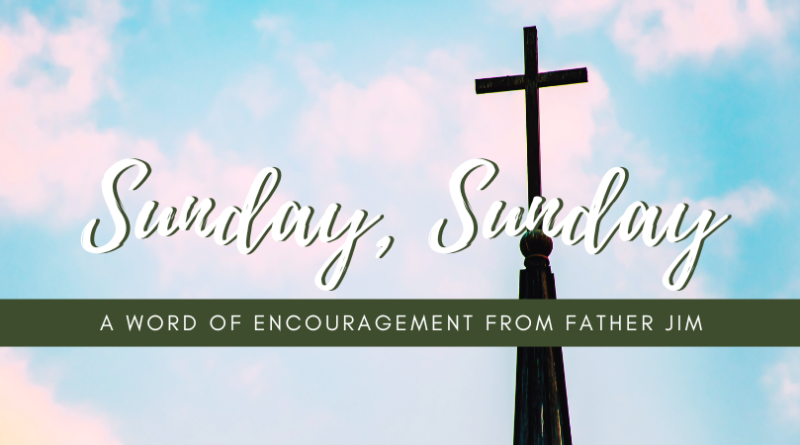Sunday, Sunday
This past Sunday, Rev. Nancy preached on the Mark Gospel reading (Mark 2:23-3:6), where Jesus, facing a man with a withered hand, challenged the Pharisees with the question “Is it lawful to do good or to do harm on the sabbath, to save life or to kill?” Mark adds: “But they were silent. He looked around at them with anger; he was grieved at their hardness of heart and said to the man, ‘Stretch out your hand.’ He stretched it out, and his hand was restored. The Pharisees went out and immediately conspired with the Herodians against him, how to destroy him.”
The Pharisees were looking for a reason to convict Jesus: If he cured a man’s withered hand on the Sabbath, would he be committed to “working” on the Sabbath?
Like many of you, I grew up in an era where Sunday, our “Christian Sabbath,” was protected by our government, which promoted “blue laws.” Before big supermarkets came into our area, some “Mom and Pop” grocery stores were open for only two hours (since at that time, the Roman Catholic Church allowed only two hours of “servile work” on Sundays). Many businesses were closed on Sundays, since for most Christians, Sundays were meant for worship and rest. A remnant of this is the fact that Chic-Fil-A’s and Hobby Lobby stores are closed on Sundays, and alcoholic beverages cannot be sold in supermarkets until after 12 Noon on Sundays in North Carolina.
Now, however, the tenor of “Sunday” for us Christians has changed:
- Supermarkets and bigger stores are open on Sundays, and many people who work there must work on a Sunday in order to keep their jobs.
- “Going to church” is just one of many options, especially in the wake of the pandemic, where most churches were closed on Sundays for the sake of public health.
- For many people, Sunday has become a “catch-up day,” rather than a day of rest and relaxation.
The 1966 hit song Monday, Monday by the Mamas & the Papas mentions Mondays as especially sad days. The lyrics include the words:
“Every other day, every other day
Every other day of the week is fine, yeah (yeah)
But whenever Monday comes, but whenever Monday comes
A-you can find me cryin’ all of the time.”
I’m thinking, “Why are the authors of this song ‘cryin’ all of the time’ when Monday arrives? Is it because Sunday is just like ‘every other day’ and we forget to realize its importance in our Christian lives?” And for many of us, it is!
God initiates the Sabbath for God’s people as one of the Ten Commandments. This is the only Commandment that God Himself/Godself follows:
“Remember the Sabbath day and keep it holy. Six days you shall labor and do all your work. But the seventh day is a Sabbath to the Lord your God; you shall not do any work – you, your son or your daughter, your male or female slave, your livestock, or the alien resident in your towns. For in six days, the Lord made heaven and earth, the sea, and all that is in them, but rested the seventh day; therefore, the Lord blessed the Sabbath day and consecrated it.” (Exodus 20:8-11, NRSVue)
For God’s original chosen people, the Sabbath was an opportunity to “take stock” of all that God had done for them, by worshipping the LORD and imitating God’s Sabbath rest. For us Christians, Sunday is our traditional Sabbath Day, since Jesus rose from the dead on a Sunday, and the Day of Pentecost also fell on a Sunday.
I’d like to challenge us (myself included) with these questions, noting some opportunities that God may have in store for us:
1) What are your Sundays like? What do you do (and what DON’T you do) on a typical Sunday?
2) If you cannot leave your home on a particular Sunday or if you’re on vacation, how do you worship our wonderful God outside of our faith community?
3) Do you know anyone who is homebound and might like a visit from our Eucharistic visitors on a Sunday? If so, please let Stephanie, our Office Administrator, know.
4) We will be having a training/refreshment session for current and prospective Eucharist Visitors on Saturday, June 22. Do you feel that God is calling you to explore this ministry? If so, please let me know.
5) God’s Sabbath, per Jesus, is meant not only for worship and rest, but for healing and reconciliation with God and our community. Can you think of someone whom you’ve been at odds with lately? Can we pray for him/her/them and be open to the Spirit’s call for reconciliation and peace?
6) When is your “Sabbath”? People who work on Sunday (including deacons and priests!) need to find some other day or time to take “time out” and praise God. Can you and I work toward etching out a Sabbath in the context of our work week?
7) How do you “rest”? Do you and I feel uncomfortable with just “being still,” and letting God be God? God can speak to us more clearly when we put our minds and hearts to rest—and there are many ways available that can help us come to that point of rest.
Dr. Matthew Sleeth, a former emergency physician, encountered a renewed and strengthened relationship with God when he pondered over God’s 4th Commandment. A few years ago, he wrote a book entitled 24/6: A Prescription for a Healthier, Happier Life. This book was also part of a workshop series that was offered in many churches. If we haven’t had this series offered at All Saints’, would this be something worth participating in?
Thanks for reading this! I look forward to whatever comments or questions you have about this article. You can find my information in Realm.
Blessed Sabbath to you and yours, in Christ Jesus, our Healer and Lord!
Jim Bernacki+

